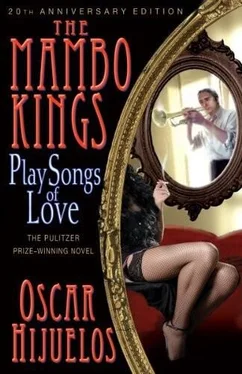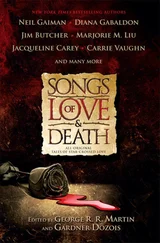And I couldn’t help myself. I walked over and sat on the couch and wrapped my arms around my father. Expected to find air, but hit on solid flesh. And his neck was warm. His expression pained and timid, like a hick off the boat. He was alive!
“Poppy, but I’m glad to see you.”
“It is the same for me, son. It will always be the same.”
Embracing him, I started to feel myself falling through an endless space, my father’s heart. Not the heart of flesh and blood that had stopped beating, but this other heart filled with light and music, and I felt myself being pulled back into a world of pure affection, before torment, before loss, before awareness.
Later, an immense satin heart dissolved and through a haze appeared the interior of the Tropicana nightclub. Facing a dance floor and stage, about twenty tables set with linen and candles at which sat ordinary but elegantly dressed people — your nightclub clientele of that day. Pleated curtains hanging down from the ceiling, potted palms here and there. A tuxedoed maître d’ with an oversize black wine list in hand, a long-legged cigarette girl, and waiters going from table to table. Then the dance floor itself, and finally the stage, its apron and wings painted to resemble African drums, with birds and squiggly voodoo lines, these patterns repeated on the conga drums and on the music stands, behind which sat the members of the Ricky Ricardo Orchestra, twenty or so musicians seated in four tiered rows, each man decked out in a frilly-sleeved mambo shirt and vest decorated with sequined palms (with the exception of a female harpist in long-skirted dress and wearing rhinestone glasses), the musicians looking very human, very ordinary, wistful, indifferent, happy, poised, and ready with their instruments.
At center stage, a large ball microphone, spotlight, drumroll, and Ricky Ricardo.
“Well, folks, tonight I have a special treat for you. Ladies and gentlemen, I am pleased to present to you, direct from Havana, Cuba, Manny and Alfonso Reyes, singing a bolero of their own composition, ‘Beautiful María of My Soul.’ ”
The brothers walked out in white suits and with a guitar and trumpet in hand, bowed to the audience, and nodded when Ricky Ricardo faced the orchestra and, holding his thin conductor’s wand ready to begin, asked them, “Are you ready?”
The older brother strummed an A-minor chord, the key of the song; a harp swirled in as if from the clouds of heaven; then the bassist began to play a habanera, and then the piano and horns played a four-chord vamp. Standing side by side before the big ball microphone, brows creased in concentration, expressions sincere, the brothers began to sing that romantic bolero, “Beautiful María of My Soul.” A song about love so far away it hurts; a song about lost pleasures, a song about youth, a song about love so elusive a man can never know where he stands; a song about wanting a woman so much death does not frighten you, a song about wanting that woman even when she has abandoned you.
As Cesar sang, his vocal cords trembling, he seemed to be watching something profoundly beautiful and painful happening in the distance, eyes passionate, imploring, his earnest expression asking, “Can you see who I am?” But the younger brother’s eyes were closed and his head was tilted back. He looked like a man on the verge of falling through an eternal abyss of longing and solitude.
For the final verses they were joined by the bandleader, who harmonized with them and was so happy with the song that at the end he whipped his right hand up into the air, a lock of thick black hair falling over his brow. Then he shouted, “Olé!” The brothers were now both smiling and taking bows, and Arnaz, playing Ricky Ricardo, repeated, “Let’s give them a nice hand, folks!” My uncle and my father bowed again and shook Arnaz’s hand and walked offstage, waving to the audience.
Oh, love’s sadness,
Why did you come to me?
I was happy before you
entered my heart.
How can I hate you
if I love you so?
I can’t explain my torment,
for I don’t know how to live
without your love…
What delicious pain
love has brought to me
in the form of a woman.
My torment and ecstasy,
María, my life….
Beautiful María of my soul,
Why did she finally mistreat me so?
Tell me, why is it that way?
Why is it always so?
María, my life,
Beautiful María of my soul.
And now I’m dreaming, my uncle’s heart swelling to the size of the satin heart on the I Love Lucy show, and floating free from his chest over the rooftops of La Salle, so enormous it can be seen for blocks and blocks. Cardinal Spellman has come to the parish to administer confirmation to the sixth-graders, and my friends and I are hanging out across the street, watching the hoopla, which has been announced in all the newspapers; limousines, reporters, clergy of every rank, from novitiates to bishops, crowded outside the church. And as they file into the church, I notice the enormous satin heart, and it makes me afraid, so I go into the church even when my friends, tough hoods in sleeveless black T-shirts, call me a little girl for doing it, and yet, when I’m inside, there’s no confirmation ceremony going on, it’s a funeral. A beautiful flower-covered coffin with brass curlicue handles is set out in the center aisle, and the Cardinal has just finished saying Mass and is giving his blessing. That’s when the organist starts to play, except, out of each key, instead of pipe-organ music, instead of Bach, what sounds is a mambo trumpet, a piano chord, a conga, and suddenly it’s as if there’s a whole mambo band in the choir stall, and when I look, there is a full-blown mambo orchestra straight out of 1952 playing a languid bolero, and yet I can hear the oceanic scratching, the way you do with old records. Then the place is very sad, as they start carrying out the coffin, and once it’s outside, another satin heart escapes, rising out of the wood, and goes higher and higher, expanding as it reaches toward the sky, floating away, behind the other.
*And, behind that another recollection about the way the ladies dressed for those nights of love: they wore skull-hugging turbans, low-riding cloches, banded berets, and feathered pillbox caps. Heavy drop earrings made with fake rubies, crystals, and pearls; white creamy pearl necklaces hanging down into low-riding necklines, breasts plumped up and sweet underneath; sequined dresses with slit skirts and pleated midriffs, tied up by black sable belts. Frilly slips, step-ins, girdles and garters, brassieres, lacy-fringed and transparent at the nipples. Good for kisses on the belly, roll of the damp tongue on the navel, nose roving over a line of black pubic hairs below. Flower-crotched flame panties, black-seamed white panties, panties with felt-covered buttons, fluffy ball panties, panties whose waistbands snapped tight and left faint pink lines along the ridges of tender female skin; hips warm against his face; black sable panties, fake leopard-skin panties, butterfly-wing panties. (And if these ladies didn’t wear the right kinds of little things underneath, he would head into the lingerie department of stores like Macy’s and Gimbels, flirting with the salesgirls and happily looking over these little things in the display cases. Like a student preparing for an exam, he would squint and arch his handsome brow, checking out the names on the labels: Tropical Rhapsody, Bronze Twilight, Tigress, Nights of Desire.
“Ohh la la, ” he would say to the salesgirl, shaking his right hand as if his fingertips were on fire. “Which one would you wear, miss?”)
*Puff of smoke, a swallow of whiskey, the sensation that something was pinching the small of his back, something with razorlike claws, making its way along the mysterious passages of his kidneys and liver… Pérez Prado. When the Mambo King, ensconced in his room in the Hotel Splendour, thought about Pérez, he recalled the first time he saw the man on a stage, off in another world and bending his body in a hundred shapes, as if he was made of rubber: prowling like a hound, on his haunches like a cat, spreading out like a tree, soaring like a biplane, rushing like a train, vibrating like a tumbling washing machine, rolling like dice, bounding like a kangaroo, bouncing like a spring, skipping like a stone… and his face a mask of concentration, conviction, and pure pleasure, a being from another world, his stage another world. Thin Pérez giving the Mambo King some of his jazzier stage moves, the loquacious and cheerful Pérez out by the bar, telling everyone around him, “Fellas, you must come and visit me in Mexico! We’ll have the time of our lives, tell you what, my friends. We’ll go to the races and the bullfights, we’ll eat like princes and drink like the Pope!”
Читать дальше












